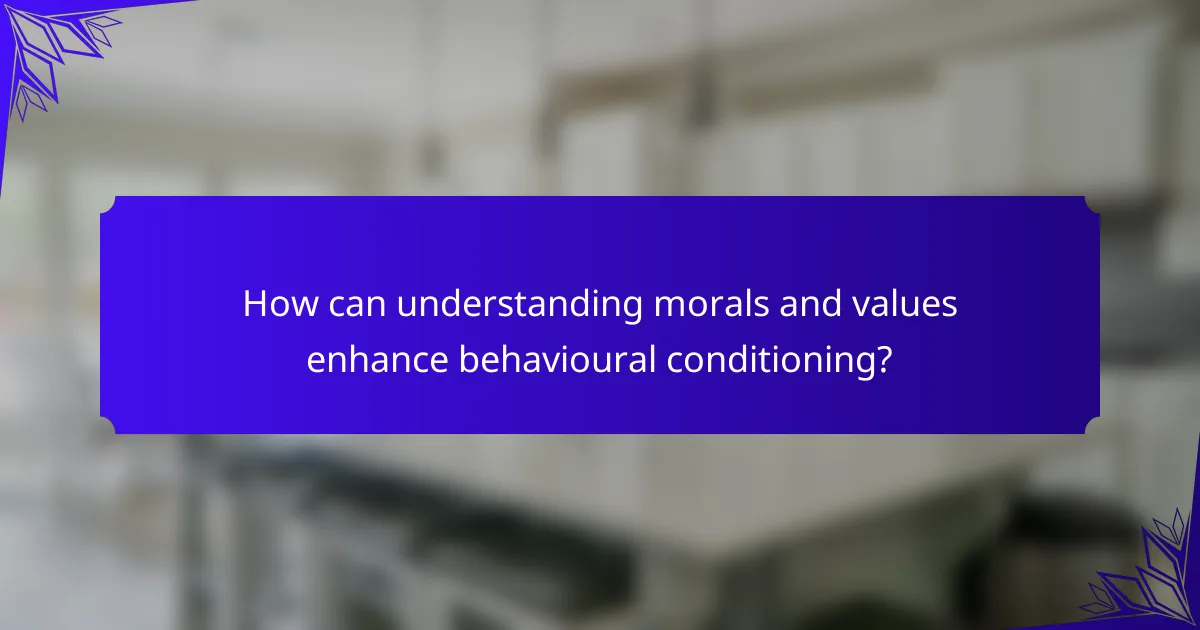Understanding the distinction between morals and values is crucial for fostering ethical awareness and critical thinking in modern education. Morals are societal standards of right and wrong, while values reflect individual beliefs. This article explores their origins and applications, their shared attributes, and how they influence behavioural conditioning. Emphasising experiential learning and community engagement can enhance the teaching of these concepts effectively.

What are the fundamental differences between morals and values?
Morals and values differ primarily in their origin and application. Morals are societal standards of right and wrong, while values are individual beliefs guiding personal behaviour. Morals often derive from cultural or religious contexts, establishing collective norms. In contrast, values stem from personal experiences, shaping individual priorities. Understanding these distinctions enhances modern learning and behavioural conditioning, fostering critical thinking and ethical awareness.
How do morals influence learning and behaviour?
Morals significantly influence learning and behaviour by shaping decision-making and guiding actions. They establish a framework for evaluating right and wrong, which affects how individuals engage with educational content and social interactions.
For example, students with strong moral foundations often demonstrate higher levels of empathy and cooperation in group settings. This aligns with the unique attribute of moral development, which fosters social responsibility and ethical reasoning.
In modern learning environments, educators emphasise moral values to cultivate critical thinking and ethical behaviour among students. As a result, moral teachings can enhance both academic performance and social outcomes, creating a more cohesive learning community.
Ultimately, understanding the interplay between morals and values is crucial for effective behavioural conditioning and lifelong learning.
What role do values play in modern educational systems?
Values play a crucial role in modern educational systems by shaping student behaviour and guiding moral development. They influence decision-making, foster social responsibility, and enhance critical thinking skills. Schools that integrate values education create a more cohesive learning environment. For instance, programmes focusing on empathy and respect lead to improved student interactions and a positive school culture. Ultimately, values serve as a foundation for lifelong learning and character development in students.

What are the universal attributes of morals and values?
Morals and values share universal attributes that guide behaviour and decision-making. Key attributes include cultural influence, emotional impact, and societal norms. These attributes shape individual beliefs and actions, reflecting collective ideals and ethical standards. Understanding these commonalities enhances personal development and social cohesion.
How do morals and values shape decision-making processes?
Morals and values significantly influence decision-making processes by guiding individuals in evaluating choices. Morals often dictate what is considered right or wrong, while values reflect personal beliefs and priorities. Together, they shape judgments, impact behaviour, and drive actions in various contexts, such as education and professional settings. Research indicates that decisions aligned with personal morals and values lead to greater satisfaction and ethical outcomes. This alignment fosters integrity and consistency in behaviour, enhancing one’s ability to navigate complex situations effectively.
What common examples illustrate morals and values in everyday life?
Common examples of morals and values in everyday life include honesty, respect, kindness, and responsibility. These principles guide behaviour and decision-making across various situations. For instance, showing kindness to others fosters community, while honesty builds trust. Values like respect for others’ opinions encourage open dialogue. Additionally, responsibility in actions reinforces accountability, shaping personal and professional relationships.

What unique attributes differentiate morals from values?
Morals and values differ primarily in their origin and application. Morals are often universal principles governing right and wrong, while values are personal beliefs that shape individual behaviour. Morals tend to be more rigid and culturally influenced, whereas values can vary significantly between individuals. A unique attribute of morals is their role in societal norms, while values are more subjective, reflecting personal experiences and choices.
How do cultural contexts impact the interpretation of morals?
Cultural contexts significantly influence how morals are interpreted, as they shape individual and collective beliefs. Different societies prioritise various moral values, which can lead to diverse understandings of right and wrong. For example, collectivist cultures may emphasise community welfare, while individualist cultures focus on personal freedom. This variation affects moral reasoning and behavioural conditioning in educational environments. Understanding these cultural nuances is crucial for effective communication and moral education in a globalised world.
In what ways do values evolve over a person’s lifetime?
Values evolve throughout a person’s lifetime due to experiences, education, and social influences. As individuals encounter new situations, their perspectives shift, leading to changes in what they prioritise and believe. Life events, such as relationships and challenges, can significantly reshape values. Additionally, cultural and societal shifts contribute to value evolution, as people adapt to new norms and expectations. This dynamic process highlights the unique attribute of values being fluid rather than static, allowing for personal growth and adaptation over time.

What are rare attributes associated with morals and values?
Rare attributes associated with morals and values include cultural relativity, adaptability, and contextuality. Cultural relativity highlights how morals and values vary across societies. Adaptability refers to the ability of morals and values to evolve with societal changes. Contextuality emphasises the influence of specific situations on moral judgments and value systems. These attributes shape modern learning and behavioural conditioning by acknowledging diverse perspectives and the dynamic nature of ethical frameworks.
How do moral dilemmas challenge established values?
Moral dilemmas often challenge established values by creating conflicts that force individuals to reassess their beliefs. These situations highlight the tension between personal ethics and societal norms. For instance, a person may face a choice between honesty and loyalty, revealing the complexity of moral decision-making. Such dilemmas serve as catalysts for deeper reflection on values, prompting a re-evaluation of what is deemed right or wrong. As a result, they can lead to shifts in personal and collective moral frameworks, influencing behaviour and learning in a modern context.
What are some uncommon moral frameworks in modern society?
Uncommon moral frameworks in modern society include virtue ethics, care ethics, and environmental ethics. These frameworks emphasise character, relationships, and ecological responsibility, respectively. Virtue ethics focuses on moral character rather than rules or consequences. Care ethics prioritises interpersonal relationships and empathy in moral decision-making. Environmental ethics extends moral consideration to non-human entities, advocating for the protection of the environment. Each framework offers unique perspectives that challenge conventional moral reasoning, enriching discussions on ethics in contemporary contexts.

How can understanding morals and values enhance behavioural conditioning?
Understanding morals and values enhances behavioural conditioning by aligning actions with intrinsic motivations. This alignment fosters consistent behaviour, improving learning outcomes. When individuals recognise the moral implications of their actions, they are more likely to engage in positive behaviours. Values serve as guiding principles, influencing decisions and reinforcing desired behaviours. This synergy between morals and values can lead to deeper learning and lasting behaviour change.
What techniques can educators use to integrate morals into learning?
Educators can integrate morals into learning through various techniques. These include incorporating moral dilemmas into discussions, using literature that highlights ethical themes, and facilitating role-playing scenarios. Additionally, promoting service learning projects allows students to engage with their communities while reflecting on moral values. Another effective method is modelling moral behaviour, as educators serve as role models for students. Lastly, creating a classroom environment that encourages open dialogue about moral issues fosters critical thinking and ethical reasoning.
How do values influence motivation in learning environments?
Values significantly influence motivation in learning environments by shaping students’ goals and behaviours. When learners align their personal values with educational objectives, they become more engaged and persistent. For instance, a student valuing knowledge will seek deeper understanding, while one valuing achievement may focus on grades. This alignment fosters intrinsic motivation, enhancing learning outcomes. Additionally, educators can leverage values to create a supportive atmosphere, encouraging collaboration and respect. By recognising the unique attributes of individual values, such as cultural background or personal interests, educators can tailor their approaches, further motivating students.

What are the best practices for teaching morals and values in education?
To effectively teach morals and values in education, focus on experiential learning and community engagement. Incorporate discussions, role-playing, and real-life scenarios to foster critical thinking and empathy.
Encourage collaboration among students to build a supportive environment. Use storytelling to illustrate moral dilemmas, allowing students to explore different perspectives.
Integrate values into the curriculum across subjects, reinforcing their importance consistently. Assess students’ understanding through reflections and discussions, promoting ongoing dialogue about morals and values.
What common mistakes should educators avoid when addressing morals and values?
Educators should avoid overgeneralising morals and values, neglecting cultural differences, and failing to model desired behaviours. These mistakes can lead to misunderstandings and ineffective teaching. Acknowledging the unique attributes of students’ backgrounds is essential for fostering meaningful discussions. Additionally, not integrating practical applications of morals and values in real-life scenarios can diminish student engagement. As a result, educators must focus on creating an inclusive environment that respects diverse perspectives while clearly communicating expectations.
How can parents reinforce morals and values at home?
Parents can reinforce morals and values at home by modelling behaviour, setting clear expectations, and encouraging open discussions. Engaging in family activities that emphasise ethical decision-making fosters an environment of shared values. Establishing routines that incorporate moral lessons, such as volunteering, can also strengthen these concepts. By actively participating in their child’s moral development, parents create a foundation for responsible behaviour.
What strategies promote a harmonious balance between morals and values in learning?
Promoting a harmonious balance between morals and values in learning involves integrating ethical discussions into curricula. Strategies include fostering critical thinking, encouraging open dialogue, and applying real-world scenarios. These methods help students understand the implications of their choices and develop a strong moral compass. Engaging students in collaborative projects can also enhance their appreciation of diverse values and promote ethical behaviour.


